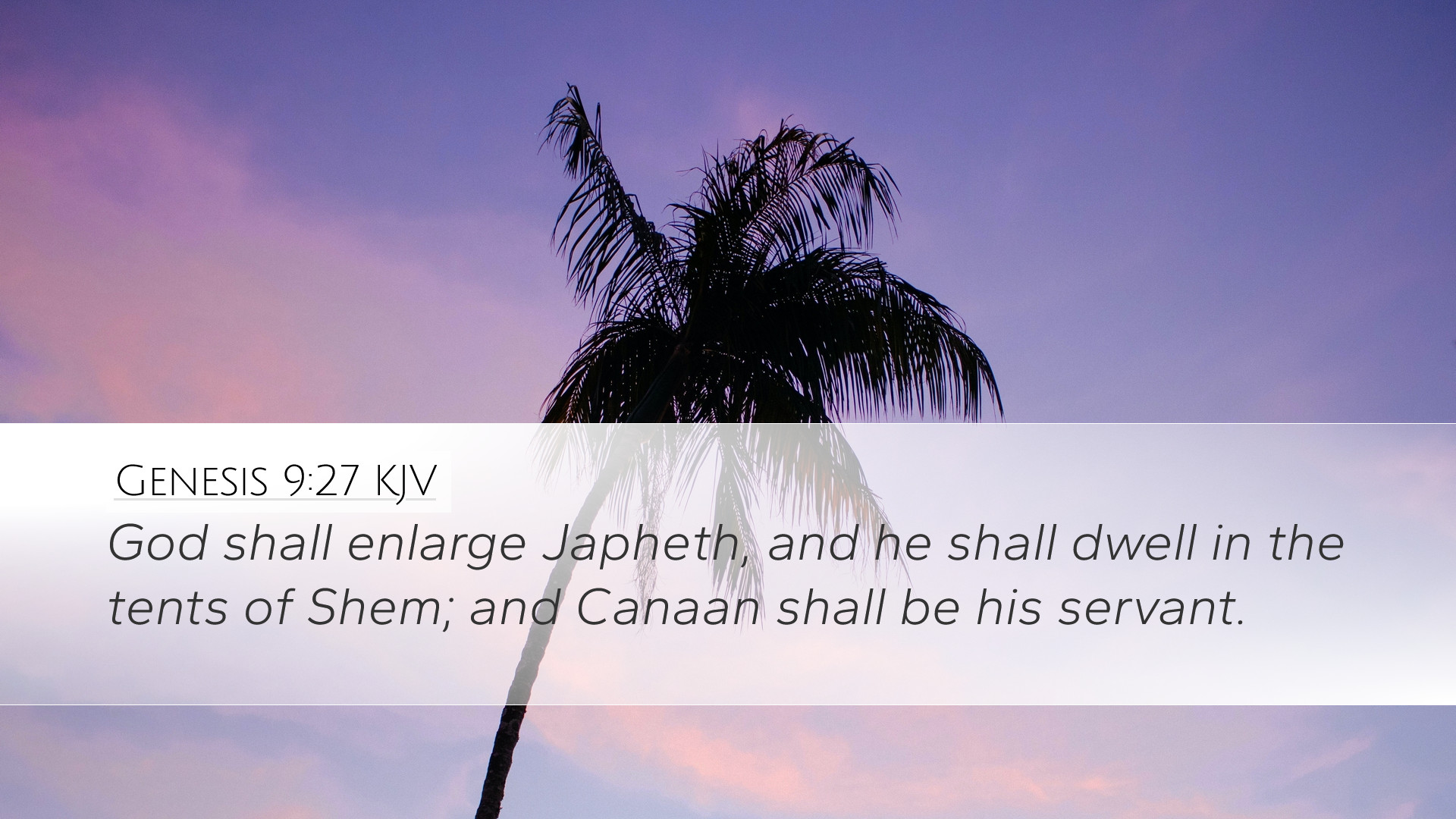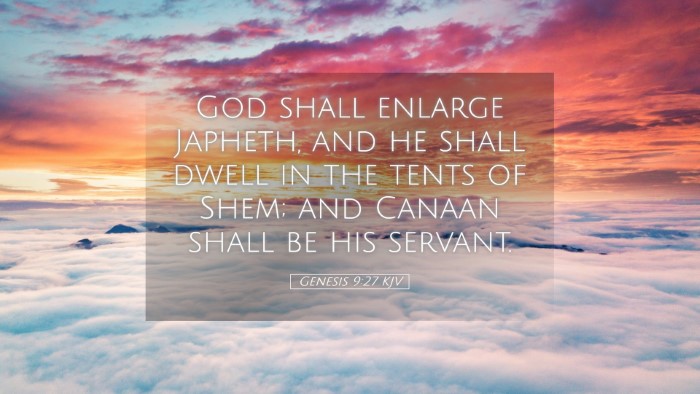Commentary on Genesis 9:27
Genesis 9:27 states, "God shall enlarge Japheth, and he shall dwell in the tents of Shem; and Canaan shall be his servant." This verse follows the account of Noah's blessings upon his sons after the flood. The prophetic declaration holds significant implications for understanding the descendants of Noah and their roles in the history of mankind.
Context and Background
The post-flood scenario in Genesis presents a fresh start for humanity, with Noah as the patriarch. Following the flood, Noah's blessing and the consequent distribution of roles among his sons provide a framework for interpreting future historical developments. As such, this passage must be viewed within the greater narrative of Genesis and the biblical understanding of the nations that descend from the three sons of Noah: Shem, Ham, and Japheth.
Insights from Matthew Henry
Matthew Henry emphasizes the divine sovereignty in the allocation of roles among Noah’s sons. He interprets the phrase "God shall enlarge Japheth" as reflective of Japheth's future prosperity and territorial expansion. Henry notes that Japheth is traditionally associated with the nations that fled to Europe and beyond, marking the significant cultural and geographical developments in human history.
Additionally, Henry points out that "he shall dwell in the tents of Shem" suggests a harmonious relationship between Japheth and Shem's descendants. This potentially indicates a theological and cultural assimilation, where Gentile nations might find spiritual blessing and shelter within the lineage of Shem, through the coming of Christ. Thus, Henry highlights the unity among the sons of Noah, foreshadowing the eventual inclusion of Gentiles into the Abrahamic covenant through faith.
Insights from Albert Barnes
Albert Barnes interprets the text with a focus on the prophetic nature of Noah's blessings. He highlights that "Canaan shall be his servant" not only serves as a prediction regarding Canaan’s subjugation by Japheth’s descendants but also reflects the theological theme of servitude and domination that is prevalent throughout the biblical narrative. Barnes argues that this encapsulates the tension between the descendants of Ham, who often faced judgment, and the more favored lineages of Shem and Japheth.
-
The prophetic aspect: Barnes asserts that the prophecy serves as a blueprint for future geopolitical realities. Japheth's descendants are to prevail, while Canaan, as a descendant of Ham, faces a grim future—a pivotal point for the understanding of Israel's conquests in the Promised Land.
-
Historical Discourse: He further discusses how the historical expansions of nations like the Greeks and Romans can be traced back to this blessing, marking Japheth as representative of Western civilization.
Insights from Adam Clarke
Adam Clarke, in his exposition, focuses on the implications of the tent-dwelling aspect—"he shall dwell in the tents of Shem." Clarke asserts that this speaks to a profound theological inclusion. This expression suggests not merely a physical dwelling but rather a spiritual communion and blessings that come through Shem, the ancestor of the Hebrews. He expounds that through Christ, who was of the lineage of Shem, all nations (including Japheth) will find a place at the table of God’s grace.
Moreover, Clarke posits that the promise of enlargement and dominion encapsulates the hope and potential imbued in the descendants of Japheth, paving the way for the spread of the Gospel among Gentile nations.
Theological Implications
This single verse serves as a theological touchstone for understanding God's redemptive plan. The mention of Japheth's enlargement signals not only physical expansion but also the spiritual invitation extended to the nations. Through Japheth’s eventual integration into the line of Shem, the scripture foresees a time when Gentiles would receive God's promises.
Additionally, exploring the contextual significance of servitude in this passage allows readers to reflect on the redemptive nature of servitude in Christ. The biblical theme of servitude, particularly in the context of Canaan's downfall, becomes a crucial part of understanding the unfolding history as portrayed in scripture.
Conclusion
Genesis 9:27 is a rich, prophetic verse filled with implications for Israel’s history and the future welcome of Gentile believers into God's family. The collective insights from Matthew Henry, Albert Barnes, and Adam Clarke highlight the complexity of this verse and its ramifications for biblical theology and historical narrative. It serves as a reminder of God's sovereign plans for expansion, communion, and ultimately, redemption for all of humanity.


